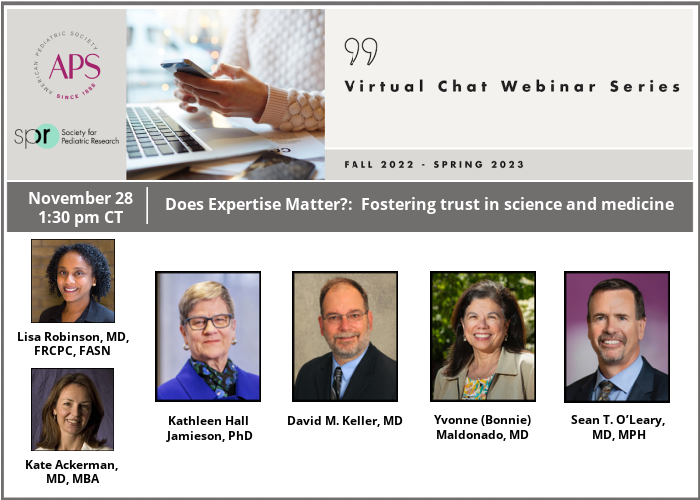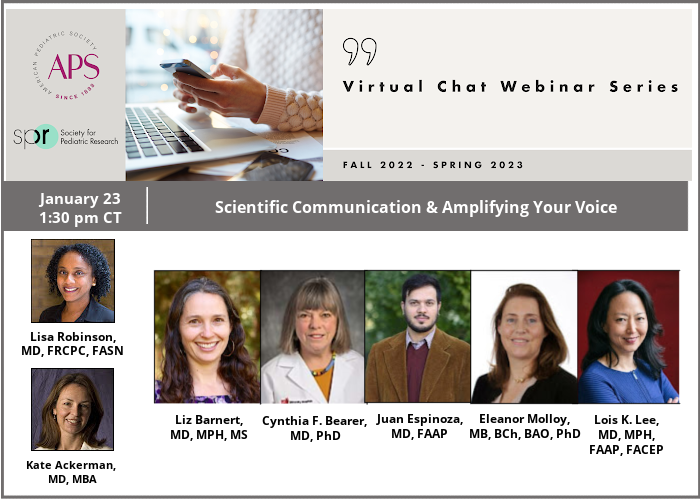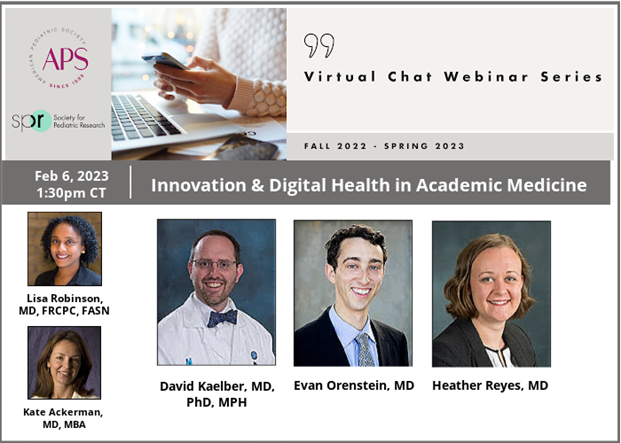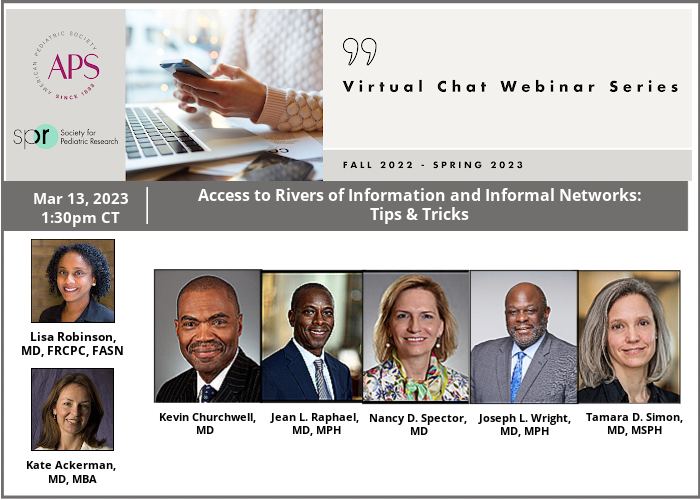“American Pediatric Society (APS) and Society for Pediatric Research (SPR) Virtual Chats”
To address the many challenges facing academic pediatrics, the APS and SPR have jointly created a series of virtual thematic meetings and discussions presented by leaders from our societies. The overall goal of this webinar series is to present timely and critical issues regarding academic pediatric medicine as provided by outstanding leaders, including medical school deans, CEOs, Chairs, Vice-Chairs, Section Chiefs, Heads of Research Institutes and others, whose diverse experiences have provided exceptional and highly impactful guidance to our field. These webinars are structured to have brief presentations from our experts, which will be followed by moderated but informal discussions “by chat” among the participants.
Topics include: Does expertise matter?: Fostering Trust in Science & Medicine, Scientific Communication & Amplifying Your Voice, Innovation & Digital Health in Academic Medicine, and Access to Rivers of Information and Informal Networks: Tips & Tricks.
We believe that this series will provide unique opportunities for early-career, mid-level and senior academicians with diverse backgrounds to share insights into vital issues that currently challenge our ability to improve child health outcomes through our missions of research, education, training, clinical care and advocacy. We hope that these sessions will provide new insights into current barriers or gaps in academic medicine, novel strategies to overcome these hurdles, and will stimulate new thinking in each of these areas.
Thanks to all who have made our chats such a success! Please share the word with your colleagues as the Chats are open to all.
The 2022/2023 schedule is listed below:
November 28, 1:30pm CT: Does expertise matter?: Fostering Trust in Science & Medicine
Kathleen Hall Jamieson is a professor of communication and director of the Annenberg Public Policy Center at the University of Pennsylvania. Her recent research on the impact of misinformation on COVID-19 vaccine hesitancy provides valuable insight for our pediatric community.
Recommended Pre-reading: Misinformation about vaccine safety and uptake of COVID-19 vaccines among adults and 5–11-year-olds in the United States
Yvonne Maldonado and Sean O’Leary will provide responses.
Open to Members & nonmembers. All are welcome.

January 23, 1:30pm CT: Scientific Communication & Amplifying Your Voice
This session will provide education and tips for communicating research to i) legislators and political leaders, ii) patients, families and communities, and iii) physicians and scientists. Topics covered will include effective ways to connect with key audiences, creative use of social media to facilitate these communications, and the future evolution of communication from formal scholarly journals.
Open to Members & nonmembers. All are welcome.

February 6, 1:30pm CT: Innovation & Digital Health in Academic Medicine
Innovation & Digital Health in Academic Medicine
Pediatric research and health care are increasingly reliant on technology, and our digital health future requires us to effectively utilize EHR and other “new” types of data sources for research and analysis of health care value. This session will review current trends in digital health research as well as major challenges. The webinar will serve to outline new opportunities ahead for embracing digital health to improve health care delivery for children.
Specific topics will include development of educational programs to train our future academic pediatricians to use digital health strategies and the promise and pitfalls of collaboration with companies developing new solutions for child health.
Open to Members & nonmembers. All are welcome.

March 13, 1:30pm CT: Access to Rivers of Information and Informal Networks: Tips & Tricks
Access to Rivers of Information and Informal Networks: Tips & Tricks
One barrier for development of a diverse group of successful academic physicians, leaders, and researchers is the unequal access to information, for example unequal access to communications and relationships that form within informal networks. This webinar will explore problems and solutions for breaking some of these barriers. This will include steps that can be taken to make sure that emerging trainees and faculty, especially those from under-represented or underserved communities, gain access to the private, powerful, informal networks that offer the access to the sponsorship, mentoring and pearls of wisdom critical to success.
Open to Members & nonmembers. All are welcome.

